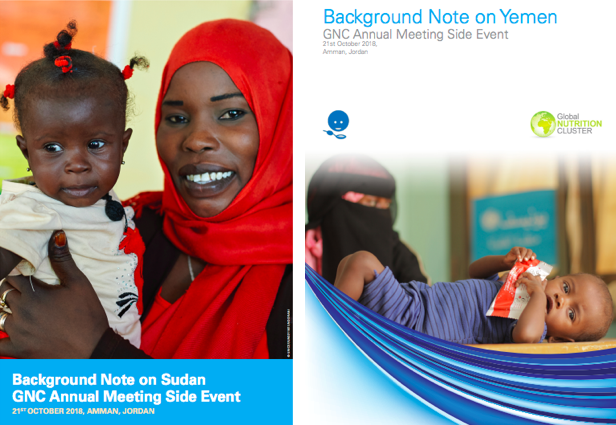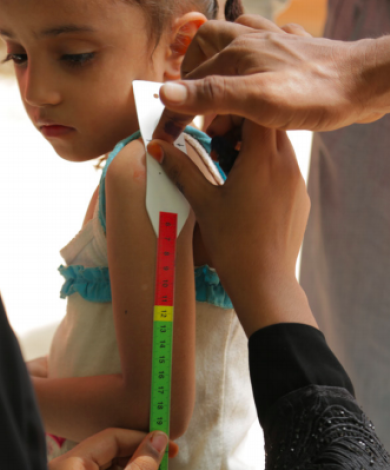ENN has returned from the Global Nutrition Cluster (GNC) annual meeting in Amman, Jordan, where it seemed that everyone was talking about the humanitarian development nexus as a means to ensure a continuum of care.
ENN provided its usual brand of knowledge management (KM) support to Nutrition Cluster Coordinator (NCC) presenters and, for the first time, the GNC, with ENN support started the annual event with a one-day meeting devoted to Yemen and Sudan. UNICEF had requested this smaller side-meeting to shine a light on the particular challenges faced and to move forward on a call to action to end malnutrition in Yemen and a nutrition investment case for Sudan. Both countries have been in protracted crises for several years, have very high rates of wasting, stunting, micronutrient deficiency, low birth weight and maternal malnutrition, and rely on annual humanitarian response plans (HRPs) to implement nutrition activities.

One consequences of the protracted nature of these crises is that neither country can ‘move on’ from short-term humanitarian support to build nutrition resilience through multi-year programming or attract the kind of flexible funding needed to strengthen government systems. They therefore reside in a perpetual cycle of humanitarian need. Presentations from a number of other crisis affected countries at the subsequent three-day annual GNC meeting again highlighted repeated humanitarian cycles with minimal longer-term financing or programming. Various vibrant plenary discussions and working groups made many recommendations. One is that longer-term donors like the World Bank and the European Union (EU) as well as initiatives like the SUN Movement need to engage with the humanitarian sector and vice versa. Apart from Italian Cooperation and USAID, there were no development donors present at the meeting – several were invited by the GNC to attend - though there were many donors represented via their humanitarian staff. Without the full engagement of development actors, it is hard to see how the increasing number of countries in this cyclical impasse, can transition to strengthened and resilient government systems where humanitarian action is required as a form of surge support and gap filling in exceptional circumstances. Concerns were raised about ‘forcing’ transition when systems and services remain fragile – contexts like Niger where system strengthening is still at its most basic and there is little to transition to. It is also very hard to see how we will meet the World Health Assembly (WHA) stunting targets when a considerable proportion of children who are stunted reside in protracted crisis contexts (estimates are between 45-75%) and for whom, to-scale multi-sectoral approaches are not receiving the level of attention they need.
ENN have been providing KM support to the SUN Movement as part of a DFID funded Technical Assistance for Nutrition (TAN) for the past three years. We have focused on 18 countries experiencing conflict and fragility (so called fragile and conflict affected states (FCAS)) in East and West Africa and in Asia. During this time, the SUN Movement has made considerable progress in building political momentum for the scale up of nutrition programmes in these countries, many of which have also progressed to develop costed frameworks and plans and improved their financial tracking of nutrition spend. However, progress in reducing malnutrition is slower than needed and there is limited evidence of increased nutrition investment in many of these 18 countries or of sustained scale up of multi-sectoral nutrition programming.
ENN’s TAN engagement has led us to question whether the SUN Movement Secretariat (SMS), which has global level staff based in Geneva, needs to regionalise and embedded in countries to help support Government progress and to develop more detailed understanding of the range of contexts in which malnourished children and adults reside.
This contrasts with the GNC which comprises a very small team of experienced professionals based in Geneva, supported by an elected Strategic Advisory Group (SAG) of member agencies. This small global team supports highly technical and experienced NCCs and information management officers (IMOs) at country level who perform an extraordinary job combining technical and country expertise with strategic insights and creativity over months and years in each country.
Since the formation of the cluster system in 2007, the GNC has evolved and developed (often with limited funding) to enable NCCs to carry out vitally important and effective coordination work. They may convene and coordinate as many as 100 international and local non-governmental organisations (NGOs). They have become highly effective in developing HRPs in conjunction with other clusters and utilising financing facilities to encourage good practice in scaling up malnutrition treatment programmes and infant and young child feeding (IYCF) interventions, saving many vulnerable lives. The GNC has further supported countries by developing tool kits and guidance, e.g. on integrated programming, as well as enabling in-country technical support. However, in many contexts the Nutrition Cluster is increasingly frustrated by being stuck in what is a ‘treatment ghetto’ where the interventions they can support are often those where the child is already wasted. In countries like Somalia and Niger, these treatment programmes are regularly scaled up and scaled down with very little opportunity for health system strengthening so that each new emergency cycle involves starting from scratch again.
The financing mechanisms available to the Nutrition Cluster are pooled country humanitarian funds (CHF) and the Central Emergency Response Fund (CERF) which are disbursed through INGOs/NGOs and UN agencies respectively. It is not possible to use this funding for direct budget support of governments. Additional HRP linked funding comes through a range of sources but is invariably short-term (annual) and is also administered through INGOs/NGOs and UN agencies. The GNC/NCCs try their level best to adapt these financing mechanisms to allow for more prevention of malnutrition as well as system strengthening. In Somalia, for example, the Nutrition Cluster tried - but was not successful - to establish a multi-year HRP. Furthermore, to prevent malnutrition, the focus of several cluster coordinators has moved to include integrated multi-sector programming. This approach is now being piloted in numerous large-scale emergencies. INGOS and NGOs also use HRP linked resources to pay government and community health worker salaries as well as provide training opportunities. There are also encouraging trends in localisation with more national NGOs receiving pooled humanitarian funding. This all contributes to system strengthening. However, without the development big-hitters (like the World Bank and EU) these efforts are always going to be a relative drop in the ocean.
The bottom line is that enormous amounts of money are being requested and spent on annual/cyclical humanitarian response – for example an estimated $1.5 billion in Somalia requested annually in recent years, yet these resources are short-term and largely unable to build stronger more robust and resilient systems and services.
So a question the ENN team kept asking itself at the meeting was - how do we break this cycle and move forward from here? How do we break down the humanitarian development silos and work collectively at the Nexus of the two? From an ENN perspective and based on working closely with the SUN Movement and the GNC over the past few years, we have several suggestions.
In the next iteration of the SUN Movement, (Road Map 3), ENN would ask that the SUN Movement regionalise some if its Secretariat functions and where there is convergence, prioritise relationships and cooperation with the national nutrition cluster mechanisms in FCAS. This will help ensure that preparedness and transition processes and activities are incorporated into national plans as well as in HRPs. Together, the GNC and SMS should be far better placed to collectively attract humanitarian and longer-term funding to support resilience building which is the ultimate aim of strengthening the nexus. They can work together to develop an investment case for nutrition programming based on a critical analysis of needs and humanitarian and development nutrition related spend and ensure that the HRP and CRF are complementary and non-duplicative. A country level partnership between SUN and the cluster could help focus attention on, and make a case for, where development or longer-term nutrition funding is most needed.
Humanitarian nutrition programming has in the past made a case for longer-term funding for programmes like community-based management of acute malnutrition (CMAM). The same may be possible with the integrated multi-sector programming currently emerging in several cluster L3 emergencies and being rolled out through inter-cluster mechanisms. As with CMAM, these programmes could be utilised to generate evidence of impact as well as an institutional framework and mechanism that SUN can build upon to implement multi-sector nutrition programming through government.
If SUN is going to realise the impact that so many of us hope for, then it would do well to learn from and work with the cluster mechanisms talent and experience to help enable that. If the GNC wants to find a means of transitioning out of repeated cycles of humanitarian programming in an increasing number of countries, then it needs to work with a movement that understands how to make a powerful case for longer-term investment in nutrition. The next step is to get these two initiatives to really start shaking hands.
Jeremy Shoham and Carmel Dolan were two of ENN's Technical Directors until 2020.

